Search results
80 results found.
80 results found.
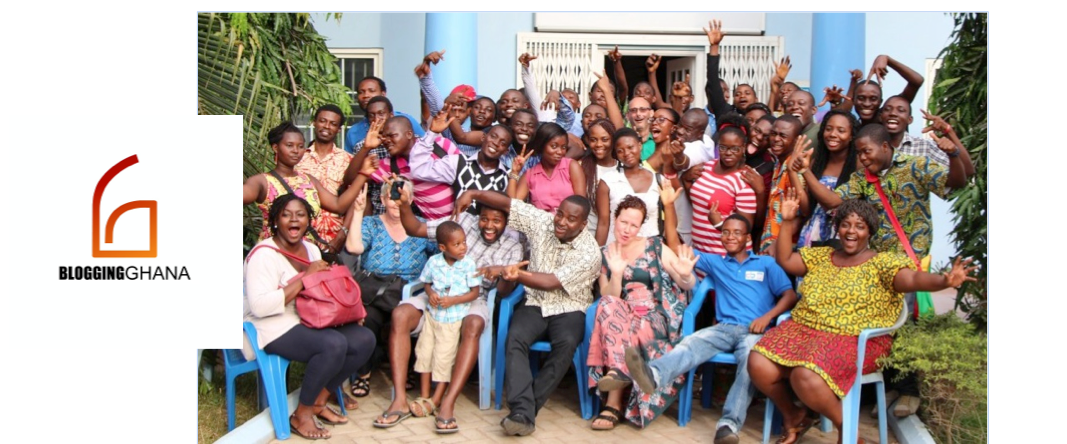
Ghana’s first organization for social media users, BloggingGhana, announces its five year anniversary. BloggingGhana started with eight members back in July 2008 and has since met monthly and today lists 250 blogs and has 40 active members.
Highlights include founding Ghana’s first social media awards, moderating online discussions around the 2012 elections through the GhanaDecides project and holding social media workshops for organizations around the country including the yearly BlogCamp conference.
Co-founder and Chair of BloggingGhana, Kajsa Hallberg Adu says:
– I am happy the group of individuals that came together in 2008 is today a tool for positive change in Ghana. We have just concluded the GhanaDecides project which by all measures was a success and we are in the planning stage for upcoming projects using technology for more voices to be heard. We also welcome new members!
The anniversary is celebrated with a birthday party on Sat 21 Sept, 2013 together with Bless The Mic, a platform for upcoming artists in Ghana, also celebrating five years. Bless The Mic will be celebrating with a string of events starting the same weekend. At the party BloggingGhana’s new aggregator website will be launched.
Learn more about BloggingGhana on BloggingGhana.org or follow us on Facebook.com/bloggingghana or on Twitter @Bloggingghana
***
Kajsa Hallberg Adu 0249187210 kajsa@bloggingghana.org
Edward Amartey-Tagoe 0244709575 edward@bloggingghana.org
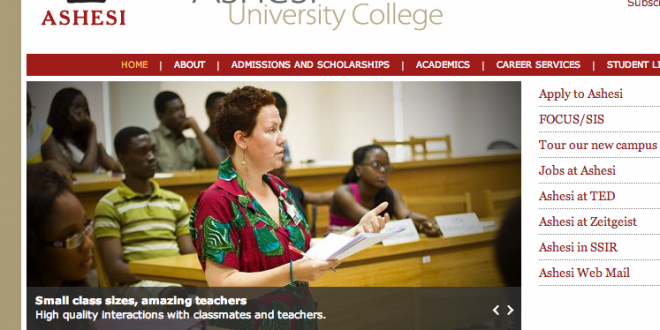
As soon as I have unpacked my bags, fall has started and I immediately have an interesting week ahead:
Wed – Kick-off at Ashesi (who right now feature a pic of me on the website to illustrate what we do, see above)
Thu – Election Petition verdict comes in, stay tuned to Ghana Decides Website and Facebook page
Fri – Start my last year as a PhD student (hopefully!) at Institute of African Studies, University of Ghana.
Sat – TEDxCapeCoastEd – a conference on “broadening the frontiers of education” and maybe Chale Wote festival pre-party in the evening…
And on Sunday, this being Ghana, I of course have some funerals to attend…
I have a handful of emails in my inbox about events with Ghanaian/Nigerian/Afropolitan writer and filmmaker Taiye Selasi taking place on three different days in three different venues this week. Her book Ghana Must Go came out recently and with favourable reviews from the right outlets, the excitement among book nerds in Ghana has been palpable!
Tonight, I get to hear her speak (at the Yale Club of Ghana conference), so before her persona clouds my judgement of the book, I wanted to scribble down my mini review.
The story was not the usual returnee/ IJCB* story as it chronicles a whole family’s return to Africa rather than just one, hip 30-something. That means we have a nice gallery of people: two parents, four children, later a few partners, house keeper, friends and one new wife, but the basic frame is those six. Maybe I am biased to this group size, being one of four kids myself, however I believe it creates a certain space for the story to unfold.
The Ghana Must Go book is divided into three parts: Ghana, Must and Go. I love authors’ quirks like this – it is elegant and fun! “Ghana” about the father in Ghana and his house (oh, how I love this house…the slowly built, carefully designed dream…with rooms for all the children and a wild center of greens, grass that you can feel under your soles…almost an allegory to the Ghana Must Go Book?), “Must” about the troubled, beautiful and brilliant siblings, left in the US. Go about a return that heals.
And wow! There are many things to heal in this book. Wanna-be-authors get to hear there must be at least one major conflict and this book is overflowing of them! It is definitely not a feel good book, but to me it rings true.
The language is not overly decorated, but one that provides vivid images, maybe it is Ms Selasi’s filmmaker side that shines through? We also get served with insights – I kept highlighting little gemstones of them when I was reading.
To conclude, the hype is not for nothing – it is a great book in my opinion – one I will reread and recommend to many friends and students. And I heard the two prior events were full to the brim, oh how Ghana has been waiting for a literary star!
* I Just Came Back, read it in the last New African of African Business Review Magazine!
The other day, I had the pleasure of meeting Fiifi Baidoo and Josiah Eyison of iSpace Ghana. iSpace is an idea of bringing together the tech community, social entrepreneurs and related folks, like bloggers in Ghana. iSpace is also an amazing space on the fifth floor of a building between the buzzing Oxford street in Osu and the La Beach, it offers lovely views and – by the end of this month – office, meeting and lounging spaces for the community.
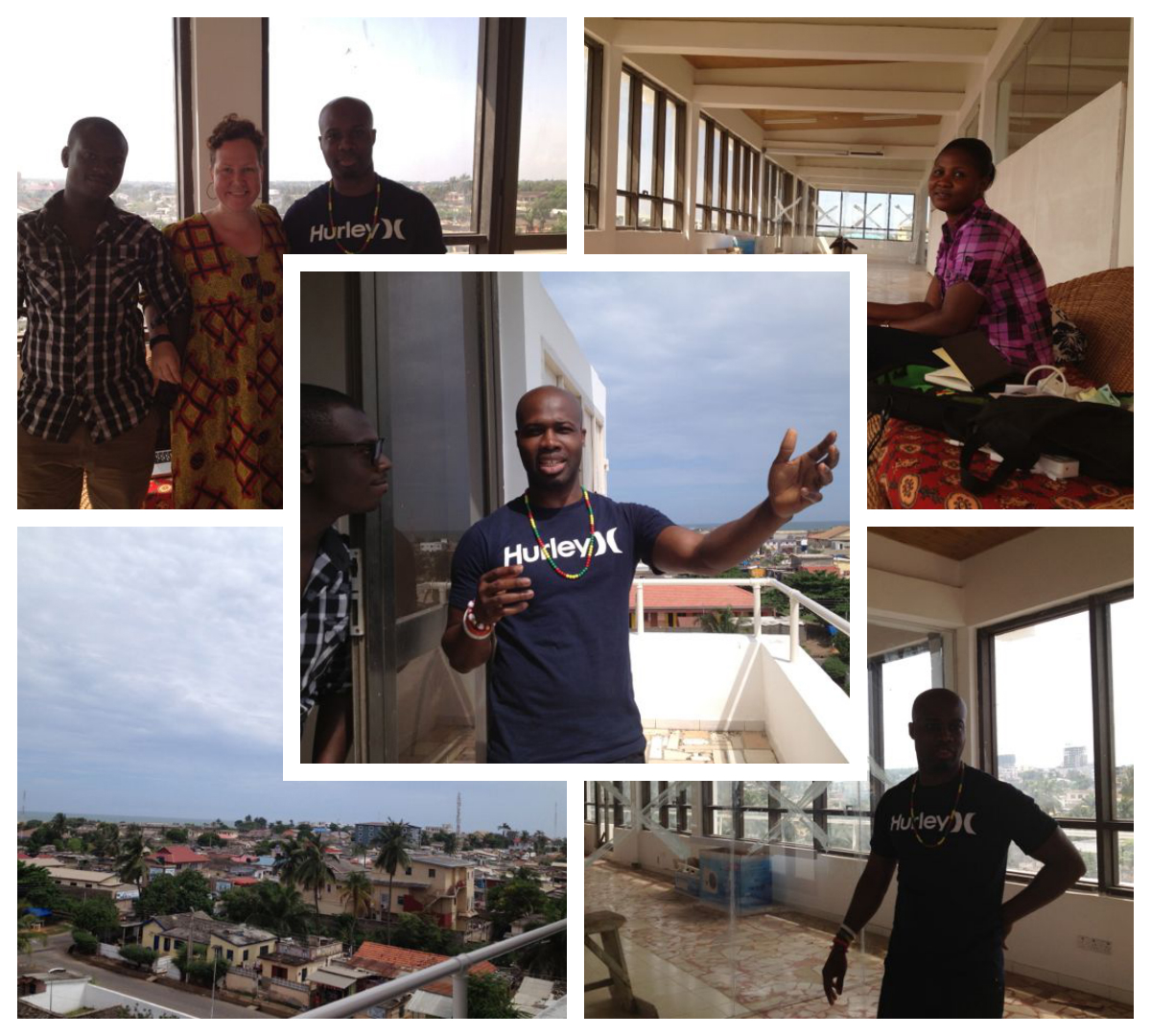
Clockwise from “noon”: a view of the full space with assistant Dorcas at the front, Josiah at the conference room glass wall, view(!), me flanked by the iSpace guys and in the middle Josiah describing the plan and Fiifi listening.
I walked away from our first meeting impressed by the vision (“in two years we have out-grown this space”) and the social concern (“we are doing this so that we can come together and solve Ghanaian issues”) and I can definitely see how BloggingGhana members can use this hub.
Eric Hersman, or White African as we know him, says about tech hubs in Africa:
“The tech hubs in Africa provide a home for those with new and innovative ideas, create an atmosphere where they are encouraged to try new things, and most importantly are able to meet like-minded individuals they can grow with.”
To sum up, iSpace is wonderful news for a community that is growing stronger by the day, but until now lacks a space to come together!
Read also Edward Tagoe’s informative post on iSpace, iSpace’s website or Google+ page. Other African tech hubs are listed with AfricaHubs.
Last month, I was moderating a talk on the Creative Economy in Ghana for the Adventurers in the Diaspora series follow them on Facebook to never miss their events!). What is the creative economy anyway? I did some research before accepting the job and came across a very inspiring 400 page report made in 2010 by the United Nation’s Conference on Trade and Development (UNCTAD) PDF here.
Some highlights of the report, in my opinion, were its case studies including Nigeria’s Nollywood and the Africa Remix exhibit.
The report also offered 10 key messages for policy makers:
The panelists Korkor Amartefio, Cultural practitioner, Dzifa Gomashie, Deputy Minister Nominee for Tourism, Culture and Arts, Odile Tevie, Nubuke Foundation and Zagba Oyortey, new director of the Ghana National Museum, framed some issues for Ghana:
1. Little data
We do not know the size of the creative economy in Ghana. Not how much the arts market is worth, how much beads and traditional crafts add to GDP or what the growth of the music industry is. Room for much research! With this type of data, we could canvass for more of number two on this list!
2. Little Government support
Apparently, government has not yet discovered the creative economy as a potential future gold mine. It seems, we are to busy with galamsay small scale gold miners, maybe…MUSIGA ha sbeen supported with a house, we have national centers of culture around the country, but apart from those structures (of which some seem to be falling apart), government is not surrounding itself with Ghanaian culture, promoting Ghanaian artists on their travels nor collecting Ghanaian art.
3. Lack of cooperation/information
From the discussion, a problem can be to find a space for an event. A suggestion was made to create a list of possible venues, their cost and availability for cultural practitioners to use. At a different event last week about marketing for cultural organizations, the lack of information was again highlighted. Organizations need training on how to sell themselves, but also structures for promotion and information sharing.
4. Education
The creative economy is much related to education, however the UNCTAD report itself does not really make the connection as noted by Pascal. In Ghana, creativity is not necessarily celebrated and on all levels of the economy we can see the effects of the lack of creativity. All from the 10th person selling the same food stuff in the same place to the bank that does not brand itself for any particular customer group or the CEO who never promotes creativity.
5. Money for enforcement of new laws
Since last year, Ghana has a new set on Intellectual Property laws (remember the “kenta” shoe?). That is great, but how do we make sure those laws are enforced?
The cure for it all is ENGAGEMENT. I was happy when the National Museum’s Mr Oyortey mentioned this in his very first contribution for the evening. The institutions need to engage with their audience and their counterparts, we the public need to attend events, buy art and let the creative economy make all our lives more sustainable and more fun!
Photos by Naa Oyoo Quartey/Ganyobinaa.
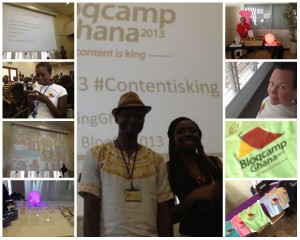 Saturday 23 March 2013, Ghana’s second blogcamp or conference for bloggers took place. In the evening Ghana’s forst Social MEdia awards were held at the same venue. It was amazing and two days later, I am still tired and slightly overwhelmed.
Saturday 23 March 2013, Ghana’s second blogcamp or conference for bloggers took place. In the evening Ghana’s forst Social MEdia awards were held at the same venue. It was amazing and two days later, I am still tired and slightly overwhelmed.
I will not tell you about everything that happened (Kinna did that already very well), neither will I talk about my trip to the venue (far less interesting than Kofi Larbi’s), but just offer some thoughts – as one of the cofounders of BloggingGhana – the organizing body behind the event:
1. Do we really have 400 people plus in Ghana interested in blogging to the point they spend a whole day, and transport costs, learning more? Amazing!
2. BloggingGhana has been about friendships since the very beginning. I have made some of my most important friendships in this group and what made me happy on Saturday was that new friends seemed to be all around. Many people also met their Twitter or Blog friends in person for the first time. I had some experiences like that as well! Kinna wrote:
I wasn’t privy to any such conversation, but I’m sure there were all manners of hooking up going on! Lots of smiling, lots of hugs, some shade and a world of happiness!
That was indeed the feeling!
3. I wasn’t expecting feeling moved by that the US ambassador came by, but his speech contextualized BloggingGhana in ways I haven’t fully before realized. Hearing things like this constituted an aha-moment for me (click on link above for the whole speech):
We applaud Blogging Ghana for its efforts to encourage hundreds of Ghanaians to express themselves on a broad array of topics affecting daily life. …We support events such as this because we know that honing communication and information technology skills will directly be transferable to the expansion of business opportunities between the U.S. and Ghana, one of our highest priorities. We agree with the visionaries who founded Blogging Ghana: In the next five years more and more people are going to find employment utilizing their social media expertise.
4. The glamour of the Social Media awards were also surprising (I should have changed my clothes!) and can be credited to aforementioned diplomat, our own Nana Darkoa of Adventures from winning the Best Blog category and the organizers of the award, Fred and Golda for their attention to detail, for instance to the beautiful physical awards! (bottom left in the collage above)
5. We have already started to plan #BlogCamp14! We started around lunch time on Saturday! It will be better, bigger and more intense. We will also think of a way of making the event more sustainable, likely by roping in some of the attendees as contributing members of our organization. Watch out!
Trust me, I have so much more to say about this day and all the people I met/highfived/laughed with/gave my contacts to/directed to the right session, but talking to so many people, both in mics and face to face is tiring. I still feel exhausted. Thankful. Overwhelmed.
And Inspired.
In the news, ministerial vettings are ongoing with interesting turns around the new Minister for Gender, Children and Social Protection, Nana Oye Lithur, a lawyer (im)famous for her activism around homosexuality and human rights generally.
During her parliamentary hearing, she had to use some “double speak” to be able to go through and still not alienate her fanbase. My favorite careful wording from the vetting was when she said she has “not said any word that I will promote homosexuality”. Luckily, noone asked her if she will “promote heterosexuality”! See clips from the vetting below, my favorite quote starts at 1.27.
I have met her once, at the Humanist conference late last year, and took this photo of when Nana Oye Lithur told us about a front page of (Ghana’s largest newspaper) the Daily Graphic that was a “worst case scenario” for an activist as it zeroed in on her as a supporter of something that is more than controversial in Ghana. However, as an encouragement for others with views against the norm she concluded “it wasn’t all that bad, no real bad things happened after this” and indeed she was right, it even didn’t stop her from a ministerial position just a few years later!
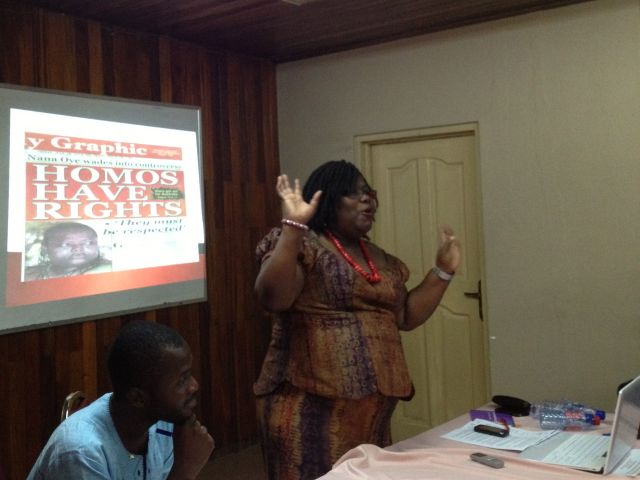
Although there were people against the nomination and much conspicuous debate, others also supported her and in the end she sailed through the vetting process and has now worked her first day. I am happy for Ghana. Oye Lithur is a clever woman and this is – even if no homosexual promotion will be carried out – a clear break with the homophobic past of Ghanaian political leadership.
In September, my blog was hacked into and all my pics disappeared. Still today, all photos before September 8th, 2012 are missing. That is painful! But there were good times as well. Here is my Blogging Year 2012:
January
We had the first meeting of the year with BloggingGhana, I tried to launch the hashtag #GHhousing (and failed terribly) and BBC inaugurated their new debate program in Accra.
February
I found myself in the middle of a breastfeeding debate, and prepared for a presentation of my research so wrote about it and on using Google forms for research.
March
In this month, I went back to work at Ashesi University after my parental leave. Also the GhanaDecides initiative was launched together with our first campaign, iRegistered!
April
I started a series, Blogs I Read. First out was Holli’s new blog. I took my family to the Chale Wote festival organized by the AccraDotAlt crew and reported about our family addition: poultry!
May
In May, BloggingGhana held our first major event: BlogCamp. I wrote about it before it happened, then a report and then a post with pictures. And then I couldn’t help but compare it to a Swedish blog event! I also discussed the galloping inflation Ghana was experiencing.
June
A plane crash in Ghana was reported in social media before in traditional media channels – this was a tipping point for social media in Ghana! I had my first guest post and met with other people who were covering the elections online. Thanks to Google Ghana for hosting us!
July and August
I needed passport photos to travel and then I was off for vacations!
September
I came back from my vacation, revamped my blog, only to see it hacked as discussed above. I also launched a new career as a TV host!
October
With my new career, my blog readership increased big-time from around 50 on a good day to 1500! I was also chosen as the Blogger of the Week (BOW) by BloggingGhana and posted photos from my first TV interviews with Abu Sakara, Papa Kwesi Ndoum and others. This was a splendid month for my career, but luckily I also had time for some family fufu and for Sister Deborah’s hit video “Uncle Obama“.
November
The Melcom Disaster happened, killing 14, again a news that was carried by social media in Ghana. I also went to a social media and a humanist conference, both in Accra. At work, I was interviewing politicans and doing research…or rather watching the Azonto.
December
The last month of the year was dominated by the Ghanaian elections. I am proud to say that both online and on the TV-screen, I had taken part of informing the citizens of Ghana about their choices. Then the results were declared on Facebook (my post on it was read by 3000 in the first 24 hours) and soon after the opposition vowed to challenge them! On Friday, the opposition filed their complaint against the EC and the president-elect.
In conclusion, it has been a very eventful year, both for me personally and for Ghana. Specifically, I think this is a year where social media in Ghana has really taken off and more and more people turn to the Internet for their news and communication needs. Next year, BloggingGhana will meet on how to sustain the debate we created with GhanaDecides, I will meet with TV3 to see how I can be involved in future political programming. I will of course teach, have some other projects on my mind and hope to collect data for my thesis. Recently, I met someone who presented herself as an “Academic Entrepreneur” and I humbly aspire to be just that in the next year!
Thanks for reading my blog and happy new year!
For more of this, here is My Blogging Year 2011.
Yesterday at 5 PM the main opposition party came out of their closed doors meeting with the message that they will challenge the election results as presented by the Electoral Commission on Sunday. However, this was not exactly news.
The party never conceded defeat and since Sunday afternoon, when a press conference was held by the opposition New Patriotic Party asking the EC to wait with announcing the results until a review of some detected anomalies had been done, we all knew they were not going to accept the results. Later on Sunday, a meeting was held with the EC at the EC premises with the opposition, the party in power, National Democratic Congress, and the National Peace Council. Before the meeting was over, the results were declared (Wayan calls it the Facebook tipping point, by the way) and then a press conference followed. However, that press conference also told us NPP were not going to accept the results as they remarkably were not present.
So, back to last night: 30 minutes after the message from NPP, I get a Google Alert that Swedish media is writing something on Ghana – and there it is “opposition challenges election results in court”. Now the world is discussing this, and still I don’t really know what to think, hence I thought I’d ask some Ghanaian friends on their view of the intended appeal:
Friend 1: Oh, they are just sore losers, we all knew this was going to happen. Don’t worry. The case will take forever and it won’t change a thing. Well, maybe except for Ghana’s reputation of a beacon of hope for African democracy.
Friend 2: It’s great they are going to court, this is a real addition to our democracy. Look at us, no violence on the streets, going through the correct channels, discussing this thing peacefully. I am sure the opposition is doing the right thing, keeping silent would have been wrong.
Friend 3: This is so typical, first its all peace this, peace that, now nobody involved cares about Ghana, only about themselves. I’m sure Ghana in the end has to foot the bill for the court costs!
Friend 4: What? They said they are going to court? I thought they said they were going to think about it? I always thought they’d come out and say “we have discovered some irregularities, but we will not open any case, here is the evidence, we should improve our system for next election year”. They would save face, we would all win. Actually, this is still an option as they haven’t taken it to court yet!
Friend 5: Where is the government in all of this? They should come out and spur the investigations into this on, I mean else they will be seen as trying to hide something or taking power from the people. They have the most to loose, so they should act!
Apparently, election season is not yet over. What do you think of the opposition’s decision to challenge the results of the election in court?
First a little background from the last couple of days: Ghanaians went to the polls on December 7th and surprisingly also on the 8th, due to malfunctions of biometric (finger print) verification machines in around 18% of polling stations. Results started to trickle in and the media and online resources that I described in an earlier post publicised them as they came in. Late yesterday evening, I went to bed. It was then an excruciatingly even race and I thought my prediction of a second round would come true. However when I woke up this morning, Joy News /Multmedia had projected that incumbent John Dramani Mahama of the NDC would win. Numbers started to tilt over 50 percent for NDC and it still was close, but with only a few constituencies left to count seemed possible to call. Then in the afternoon, the main opposition party called to a press conference and reported irregularities on the collation centre level where they claimed votes had been added in their thousands.
Fast forward to the point when we were all waiting for the electoral commission to come out and say something. As we were waiting for EC:s press conference, TV channels were showing the empty halls of the EC premises and the EC was said to be in an emergency meeting with the National Peace Council (NEC) and the two main opponent parties, the NPP and the NDC. Just before they all came out a few minutes to 9 PM, this was posted on the EC Facebook wall:
Twitter and Facebook went wild, people were sharing this document like crazy – it appeared to be a summary of election results. Was it genuine? Why was it released on Facebook? As GhanaDecides points out, we cannot know, but here are some guesses that were mentioned on social media:
1. The Electoral Commission’s own Website came down earlier in the day (too many visitors?) and as that channel was not working they chose the next available thing, their Facebook page.
2. The meeting with the parties and the NEC was dragging out and the results were provided to show the meeting delegates that postponing declaration of results was not an option.
3. As the media was waiting in a adjacent room since a couple of hours, the results were released on Facebook to calm nerves of the press corps and the country.
Shortly after the Facebook post, the press conference finally started and the Electoral Commission confirmed the results and declared a president elect – John Dramani Mahama. However for half an hour or so, the results in Ghana’s 2012 presidential election was only available on Facebook. As the above are only guesses, hopefully we will get clarity on the process behind this historic Facebook post – the first ever Facebook post for presidential election results? – in the days to come.
In social media the discussion is ongoing if it was “good” or “bad” for Ghana that Facebook was used for this important message. As someone who works with promoting the use of social media for societal good (I am the chair of BloggingGhana, the mother organization of GhanaDecides), I think we could not have wished for a better showcase of that Ghana and Ghanaian institutions are indeed using social media and finding new and innovative uses for it for societal good. After all, Facebook is a direct and interactive channel to citizens.
What do you think?
Currently the results have been shared 1390 times on Facebook and ECs page has over 18 000 likes.
UPDATE: Read DK’s worthwhile article on the same issue here. He concludes:
“Part of social media’s appeal to the young African is its ability to enpower individuals and communities to reflect and/or portray our lives and values, both to our peers and to international onlookers. Over the past few months we turned our Facebook feeds into mock parliamentary chambers, debating the issues of the day. We turned our timelines into soapboxes, expounding our 140-character political theories. We hung out in Google+ chatrooms, like old chums in a chop bar talking politics.
Barring the odd incident, the path, though potholed, has been successfully navigated and Ghana has indeed decided. With a turnout rate just shy of 80% (up 10pp on 2008) the real winner has to be democracy. In the light of all this, perhaps it was only fitting that a nation with a dual appetite for social media and politics, has had its appetite for politics fed by a simple post on a feed.”
Today, I am all about research. Finally! This semester, it has been more than difficult to find the time to sit down and read, write and theorize due to everything else I am doing, like teaching and Frontlining. But today, it is happening.
I have already had two cups of coffee (the second one as ice coffee as its already hot out).
I have sorted all my research related papers in five piles: unread articles and reports, read – but not incorporated, African studies research not directly related to my dissertation, teaching related research and my own drafts of conference papers, timelines and dissertation chapters.
I have realized its been so long since I worked on my documents I don’t even know what version is the latest! The one in Dropbox? In my computer PhD folder? In my email? On Google Drive? Arggghh.
But then I was sidetracked and found this cute Ghanaian version of Psy’s Gagnam style: Cp3 Ghana style (She likes Ghana style) ripe with Azonto dancing, sleek Accra vistas and gorgeous people in slim jeans and everything was alright again.
Enjoy!
Last week, Kwaku Ananse wrote a guest post about problematic supervisors. A main problem,he concluded is misguided advice suggesting you focus only on your dissertation:
In our times, employers want graduates with experience, widely interpreted either as teaching, research experience as evident in a publication, or both.
This reality brings me to the issue of taking initiative outside the normal routines of the graduate program.
1.One is to visit the personal websites of other graduate students in other universities who are in the same discipline as you are.Know what these students are doing in terms of the conferences they attend, the types of publications they have (and the journals they have published in etc). Being on top of these things should alert you to what your competitors are up to.
2. Another thing outside the graduate comfort zone is to test your ideas by sending cold emails to perhaps established leading scholars in the field to give you feedback regarding your use of their analytical ideas (Here, I have to say I am hesitant with important but emerging scholars). You are not always guaranteed a response but you might be surprised how some of these scholars are interested to help young intellectuals with feedback and suggestions of recent literature. These people can be your pool of what Kajsa refers to as “informal supervisors” (see her post ‘Informal Supervisors: Surviving Ph.D‘) who can be both local (in other departments in your school as well as in your program) and as well as international.
3. One important thing to note in a graduate school is not to see yourself as incapable of publishing in leading journals in your field.
Several things can happen with such an approach: the paper might be rejected (and good reviewers will give you details as why the paper was rejected); paper accepted (but with some revision,either substantial or minor). Whatever the case, the plus side of taking such an initiative is that you have begun a process that is going to be part of your academic life.
This guest post is written by fellow graduate student Kwaku Ananse, one of my readers.